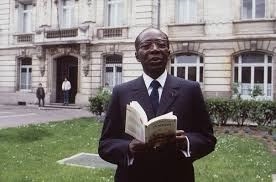.jpg) |
| Leopold Sedar Senghor (bbcnews) |
Born October 9, 1906 in Joal Senegal and died on December 20, 2001 in Verson in France, Leopold Sedar Senghor is a French poet, writer and politician then Senegalese and he is the first president of the Republic of Senegal (1960-1980). It is the symbol of cooperation between France and its former colonies. His poetry based on the song of incantatory speech is built on the hope of creating a civilization of the universal and federating traditions beyond their differences.Leopold spent the first years of his life at his home with his maternal family and then returning to his father Le Jeune Leopold attended the Catholic mission of Joal (with Father Dubois) from where he learned the catechism and the first roughly of the French language . Leopold is passionate about French literature. A good student, he succeeds the baccalaureate in particular thanks to French and Latin, then the director and his teachers decide to send Senghor to continue his studies in France. Senghor leaves for the first time Senegal at the age of 22 years. In 1928 Senghor arrived in Paris, according to his own words he studied in the preparatory literary class at Lycee Louis-le-Grand. In 1935, he was awarded a Grammar Aggregation Competition after an unsuccessful attempt. He is the first African winner of this competition. To present himself there he had to apply for naturalization.
 |
| Leopold Sedar Senghor (artfilmjournal.wordpress.com)) |
In 1939, Senghor was enlisted as a second-class infantryman in a colonial infantry regiment of Africans, despite the naturalization of Senghor in 1932.On June 20, 1940, he was arrested and taken prisoner by the Germans. He was interned in various prison camps (Troyes, Amiens, Romily). He was then transferred to Frontstalag 230 de Portier, a prisoner's camp reserved for the colonial troops, the Germans wanted to shoot him the day he was incarcerated and the other black soldiers present.They escaped from this massacre by crying "Long live France, Long live Black Africa". The Germans dropped arms because a French officer made them understand that a purely racist massacre would harm the honor of the Aryan race and of the German Army. Senghor facilitated the escape of two French soldiers, he was transferred to the Landes Disciplinary Camps at the end of 1941. In 1942, he was released on account of his illness. In all, Senghor spent two years in the prisoners' camps, during which time he dedicated himself to the recitation of poems. He resumed his teaching activities and participated in the resistance within the framework of the National University Front.
In the aftermath of the Second World War, Senghor became Communist. He took over the chair of linguistics at the French National School of Overseas which he occupied until the independence of his country in 1960. In the course of one of his voyages to research on the poetry Serer in Senegal, the local leader of the socialists Lamine Gueye proposed to him to be a candidate for the deputation. He accepted the idea and was elected deputy of the Senegal-Mauritania constituency to the French National Assembly where the Colonies had just been granted the right to be represented. Senghor differed from Lamine Gueye on the Dakar-Niger railway strike, which was voted against because the social movement paralyzed the colony, while Senghor supported the movement, which earned him great popularity and inspired him to write one of his most beautiful poems. After leaving the African section to the French section of the international worker who had largely supported the social movement.
Re-elected deputy in 1951, as independent of overseas, he is the secretary of State to the presidency in the government of the first March 1955 to the First February 1956, becomes Mayor of Thies in Senegal in November 1956 then minister adviser of the government Michel Debres, from 23 July 1959 to 19 May 1961. He was also a member of the Commission of the Fifth Republic, General Counsel of Senegal, a member of the Grand Council of French West Africa and a member of the Parliamentary Assembly of the Council of Europe. Senghor is also an advocate of federalism for African states. Senghor decides to form with Modibo Keita, the ephemeral Federation of Mali with the former French Sudan (the present Mali).The Federation of Mali was constituted in January 1959 and regrouped Senegal. The two federalists (Modibo Keita and Senghor) share responsibility, Senghor holds the presidency of the Federal Assembly and Modibo Keita takes over the presidency of the government. The internal dimensions caused the Federation of Mali to break up. On 20 August 1960 Senegal proclaimed its independence and 22 September 1960 Modibo Keita proclaimed the independence of the Republic of Mali. Elected on September 5, 1960, unanimously by the Federal Assembly, Senghor presided over the new Republic of Senegal.He is the author of the Senegalese national anthem . On 22 March 1967 Senghor escaped an attack, the culprit was sentenced to death. Two years before the end of his presidential term, Senghor resigned by saying that he did not want to be President for life.
 |
| Leopold Sedar Senghor (poetryinvoice.com) |
In 1982 he was one of the founders of the association France and developing countries whose main objective was to raise awareness of the problems of development. He was also a member of the honor committee of the International House of Poets and Writers. After being appointed Prince of the Poets in 1978, he was elected to the Academie Francaise on 02 June 1983, he was the first African to have served on this post. Sick, Senghor spent the last years of his life with his wife in Verson in Normandy, where he died on December 20, 2001. Not only was he brilliant in politics, he was one of the best poets.
Page created on 4/22/2017 12:00:00 AM
Last edited 4/22/2017 12:00:00 AM
